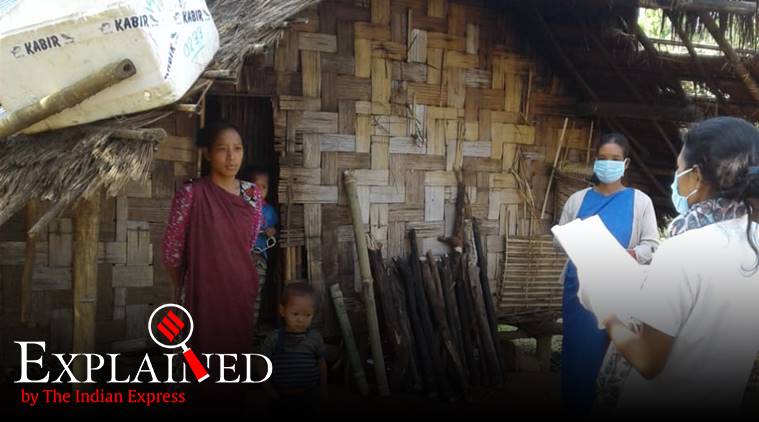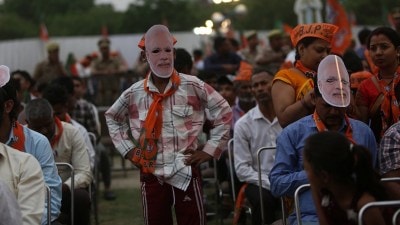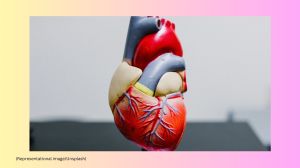- India
- International
Explained: Why Meghalaya is treating every resident as an asymptomatic carrier of Covid-19
Meghalaya has introduced a ‘Behaviour Change Model for living with COVID-19’ which involves treating every resident as an asymptomatic carrier of the virus. This is how it works
 An awareness drive carried out by ANMs and ASHAs in different parts of Meghalaya (Source: Twitter/NHM Meghalaya)
An awareness drive carried out by ANMs and ASHAs in different parts of Meghalaya (Source: Twitter/NHM Meghalaya)
On June 2, the Meghalaya Health department issued a new health protocol saying that the state would consider everybody as an asymptomatic carrier of the novel coronavirus “by default”. The order reasoned that this was the best way to prevent the threat of community transmission with thousands of migrants returning to the state from different zones. “The state should take a proactive approach of preparing itself by acting as though community transmission is already happening” stated the order. Behind this announcement is a four-pronged plan that suggests not just testing everyone who enters the state and thereafter isolating them, but a psychological model which stresses on behavioural change and training.
What is the concept behind this approach?
“The pandemic has resulted in two kinds of fear: fear for the loss of life and fear for the loss of livelihood,” said Meghalaya Health Commissioner and Secretary Sampath Kumar, “That is why we wanted to build a system through which you can protect yourself and carry out your livelihood at the same time — because let’s face it, you simply have to live with Covid.” The bureaucrat — who holds the rural development and health portfolios —said this could be achieved through what psychologists call the “locus of control”, or the extent to which one feels control over events in their lives. “The point is to consider that the problem is from within,” he said, “The moment you think you could be Covid positive, then your entire behaviour will change — you will be more cautious and feel responsible for your actions, and thus help reducing the risk of community transmission.” The idea is called the ‘Behaviour Change Model for living with COVID-19’.
How will it be implemented?
As per the order, everyone in the state shall be treated as “Category ‘A’ patients unless they are tested on a continuous basis.”
“This implies living with the assumption that every person could be an asymptomatic, mobile carrier of the Covid-19 virus, with a probability of transmitting the virus to others unknowingly,” said Kumar. The ‘Category A’ patient will have to follow three non-negotiable practices: compulsory mask-wearing, hand hygiene and social distancing.
For that the department has built a series of training modules by dividing the entire population into three categories: one, the elderly who are above 65, two, those who have comorbidities and three, the mobile group, or the mobile workforce, including students who are constantly on the move. The training will be carried out by the Health Department with the help of identified master trainers. At the end of it, a certificate will be provided to all those who have successfully completed training. “Currently we are training the trainers,” said Kumar, “This includes government department officials (including headmen of villages) as well as private agencies (taxi associations, market unions, school teachers).” Rules will differ from sector to sector depending on the kind of activities their profession involves.
What are the key components of training?

The two main components include checklists and self-help diaries. “For the senior population, or those who are living with comorbidities, the self-help diaries can be used as a tool to monitor themselves,” said Kumar. ASHA (accredited social health activist) and Anganwadi teams are going house to house to train this section. For the mobile workforce group, Kumar said the training is rooted on the psychological concept of mindfulness — basically paying attention to what you are currently doing, and observing every step you take, since you are technically an asymptomatic carrier. For all three groups, a checklist — with a set of model questions which address topics such as hand hygiene, social distancing, respiratory etiquette — will be provided.
📣 Express Explained is now on Telegram. Click here to join our channel (@ieexplained) and stay updated with the latest
How will it ensure results?
“First thing we must remember is that behavioural change does not happen through scaring people,” said Kumar, “We hope that constant repetition of these habits, using the self-help diary or checklist through appreciation and progress monitoring, will lead to change.”
The checklist is designed in such a way that one can rate themselves out of ten based on their performance on that day. “For example, the question might ask ‘Did I take a bath or wash my hands and feet thoroughly after returning home?’. If the answer is yes, then you get one point,” explained Kumar, adding that they are especially depending on village headmen at the local level to influence such changes.
READ | Behind Northeast’s Covid-19 surge, stranded migrants returning home
The government is also considering a social reward system — where points can be redeemed for items at shops etc. “We are only considering this idea at this point,” he said, adding that he hopes that the shift in responsibility will “create a supportive environment that will remove fear and encourage compassionate care towards fellow beings.”
More Explained
EXPRESS OPINION
Apr 25: Latest News
- 01
- 02
- 03
- 04
- 05











































